Category Archive for Spain
Goth Madrid, Spain! Pavilions Hotel review, Lucifer Fallen Angel fountain: Retiro Park Satanic sculpture, Robot Museum.
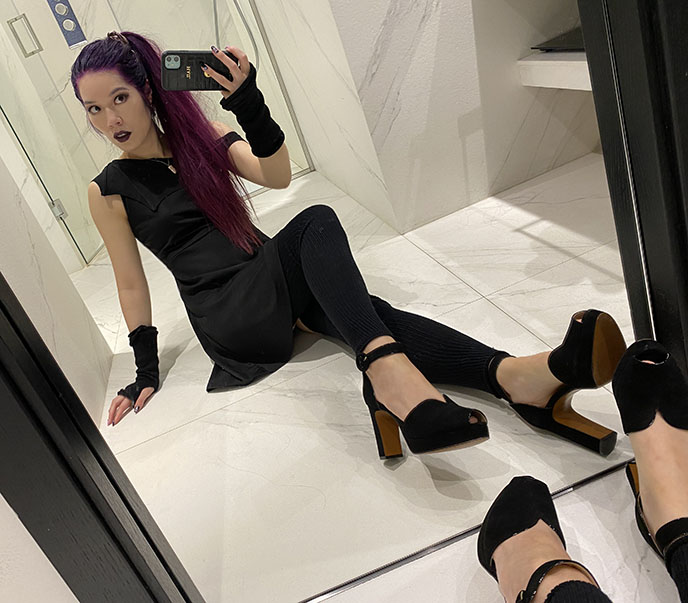
It wasn’t until my third trip to Spain that I discovered… I’m mad about Madrid!
Many travellers overlook the Spanish capital in favor of cities like Barcelona and Granada (which is what I did, on my previous two trips). This time, I spent a few days in Madrid — and realized it’s a wicked destination for those who love dark art, parks, culture and architecture (like this Goth girl).
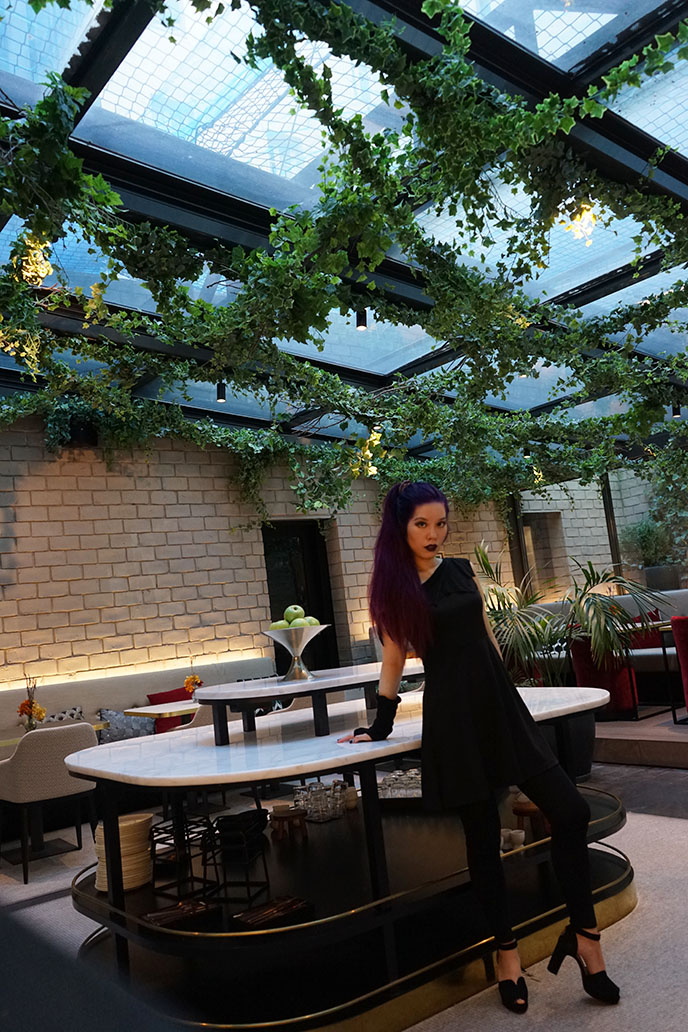
Read on for my stylish stay at The Pavilions Madrid hotel (wearing a Gothic one-shoulder dress by Fantasmagoria)…
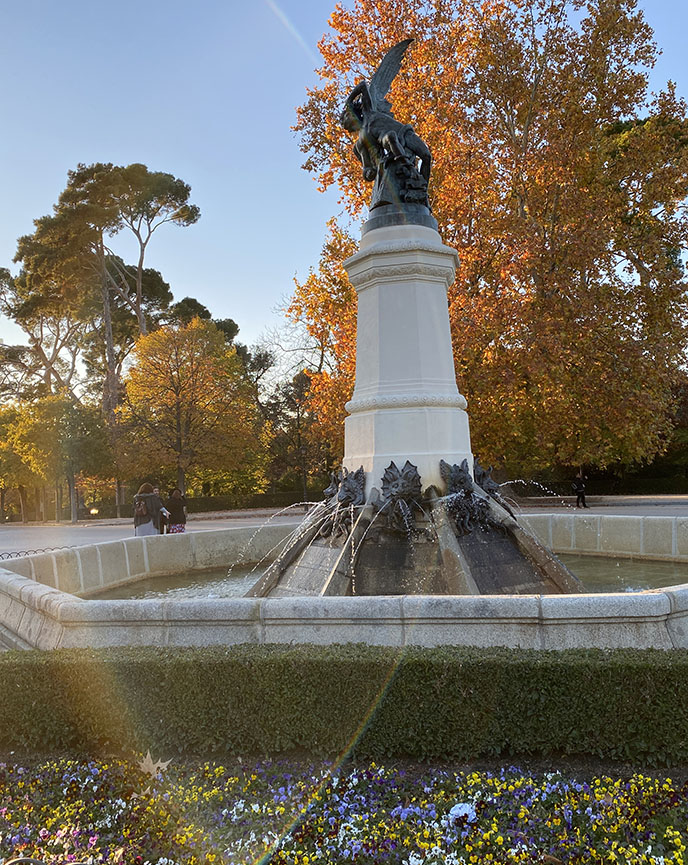
… and a visit to a 19th century monument to Satan! (This is the Fallen Angel Fountain at Madrid’s Retiro Park. Inspired by John Milton’s “Paradise Lost,” the dramatic sculpture represents the angel Lucifer falling from Heaven, with gargoyles and demons below.)

I’ll also walk you though my stress-free PCR testing experience at MedMeSafe, and give you a tour of the funky Robot Museum Jugetronica. (Already, I think you can see why I loved Madrid…)
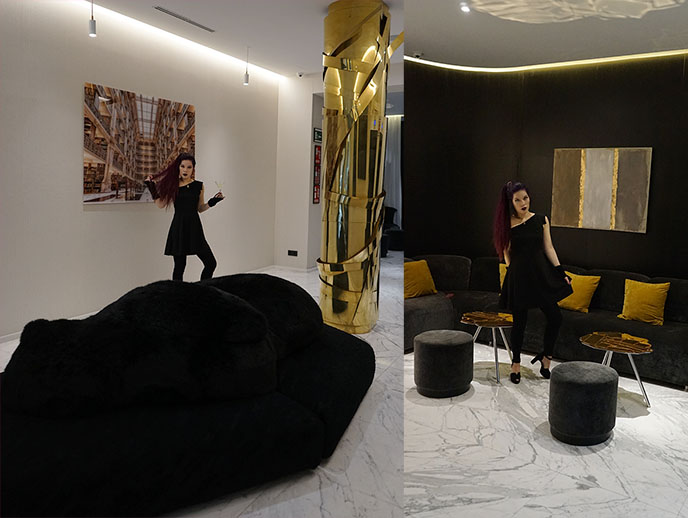
Let’s check in to my chic boutique hotel, The Pavilions Madrid, which has enticing avantgarde interiors. The luxurious hotel has a small number of rooms and friendly staff members, making my stay feel like a private getaway. Pavilions is located in a quiet and stately neighborhood of Madrid (Chamberi / Salamanca), yet it’s within walking distance to fashion boutiques, wine shops and cultural attractions.
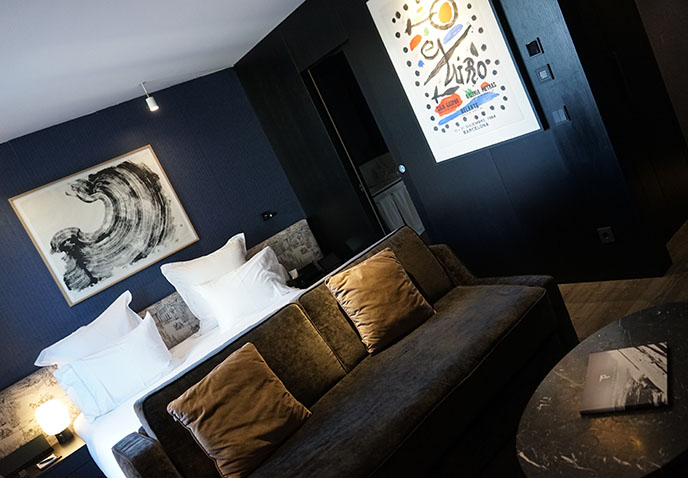
The hotel treated me to a top floor Deluxe Attic room, which is filled with Spanish contemporary art and includes a cozy bed, sofa, and modern bathroom.
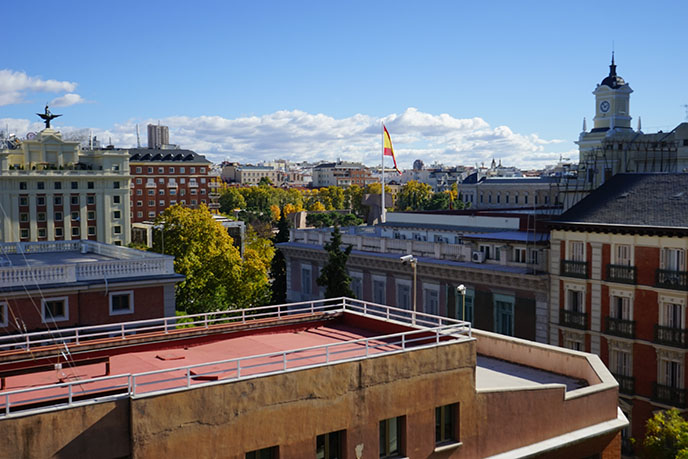
The best part… my room had a spacious terrace, with this view of the neighborhood and its classic architecture!

My “curated journey” at The Pavilions Madrid included lounging in the interior garden. Guests can enjoy cocktails and daily breakfast in this gorgeous green space.
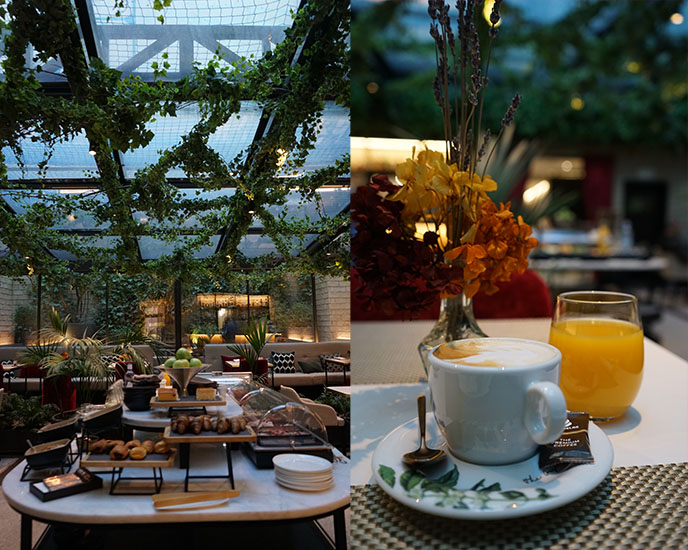
Can’t get enough of the breakfast nook, which has trailing plants hanging from the ceilings and walls. Every morning, I enjoyed fresh cafe au laits and eggs made to order, along with a selection of local cheeses, fruits, grain breads and more. (Be sure to try the quince paste, and tomato jam.)

In the afternoon, I kicked back with colorful drinks by bartender Gemma. Her creations include a salt-rim margarita, gin fizz, and rainbow citrus cocktail. (Keep reading for more of my stay at The Pavilions Madrid at the end of this story…)

I’m sure you are curious — what was it like to do a PCR test in Spain?
Many foreign visitors — including all Canadians — must now take a PCR or NAAT test in order to travel home (72 hours before you fly, and with a negative result of course).
Booking a PCR test can be complicated in Spain, as many clinics don’t speak English or offer an easy online system. I was relieved to discover MedMeSafe, an English-language platform with dozens of lab locations throughout Spain!
If you need an RT-PCR test in Spain, all you have to do is create a profile at MedMeSafe.com, enter your info, and select a time slot at a clinic near you (mine was centrally located in Madrid). The website is available in English, Spanish and French. You’ll get a voucher by email, which you show when you arrive. A professional performs a quick and non-invasive nasal swab, and it’s over in minutes. I received my results within 24 hours, which included a PDF letter, and I was good to go.
The MedMeSafe site has useful info, such as requirements to travel from Spain to Canada. In addition, the staff speaks English and is wonderful at responding quickly (by email and What’s App). Thank you to the team for the efficient and seamless PCR test experience. (You can find out more and book a test at a Spain lab here.)
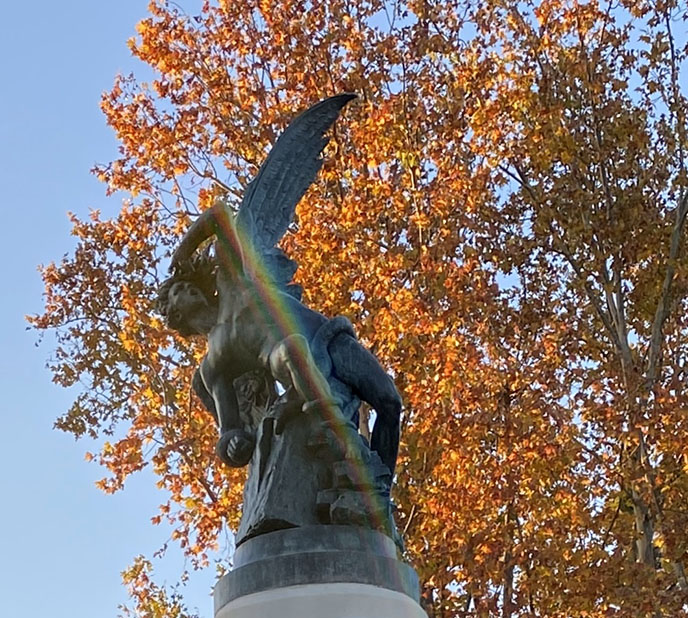
I spent my time in Madrid walking around different neighborhoods. (And walk I did… my iPhone tells me I averaged 20 – 24k steps per day!)
Of course, I made a pilgrimage to the devilish Fuente del Ángel Caído (Fountain of the Fallen Angel), located in Buen Retiro Park. It’s one of only monuments in the world dedicated to the overlord of Hell — hail Satan. The 1877 bronze sculpture shows the beautiful winged Lucifer falling from grace; it’s a masterpiece by Spanish sculptor Ricardo Bellver.
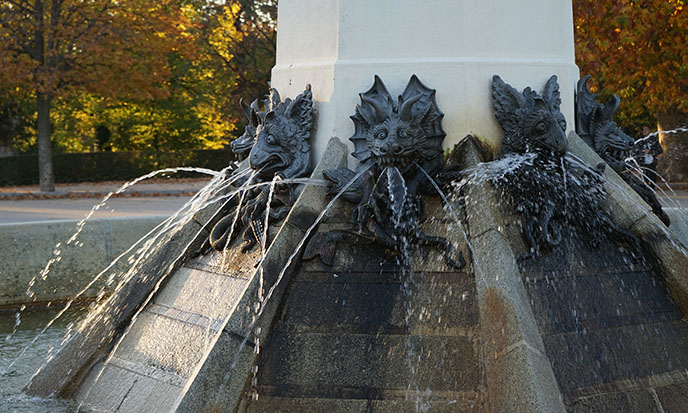
The Satanic fountain has an octagonal pedestal, which is decorated with dark demonic figures, lizards and snakes. I think these hell-beings look rather adorable, with water spurting from their fanged mouths.
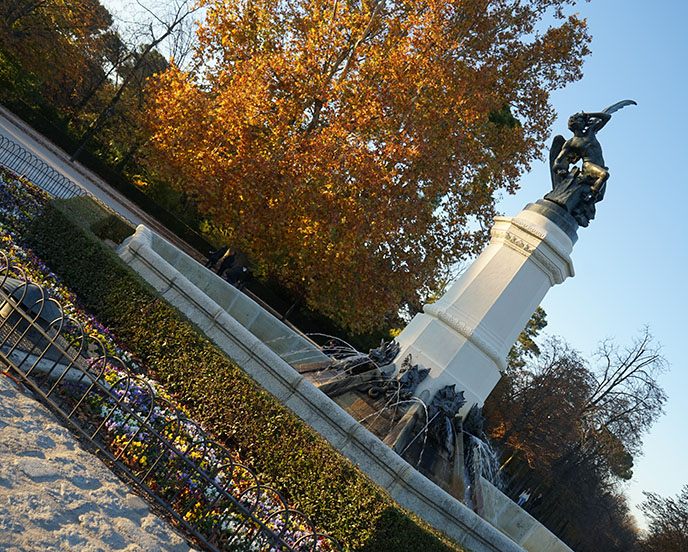
Located by the south central entrance of Madrid’s Retiro Park, the Fountain of the Fallen Angel stands 666 meters above sea level (a tribute to the number of the beast). What a wonderful artistic interpretation of Milton’s Paradise Lost.

I couldn’t get enough of Retiro Park, and spent hours here. Founded in 1505, this garden of Eden belonged to the Spanish monarchy until the late 19th century, when it became a public space.
Look for the pink Little Fisherman House (Casita del Pescador), built by a pond by King Ferdinand VII. I said hello to the ducks basking in the sun, and resident prowling cats. (The birds paid them no notice; it turns out that the animals are friends).
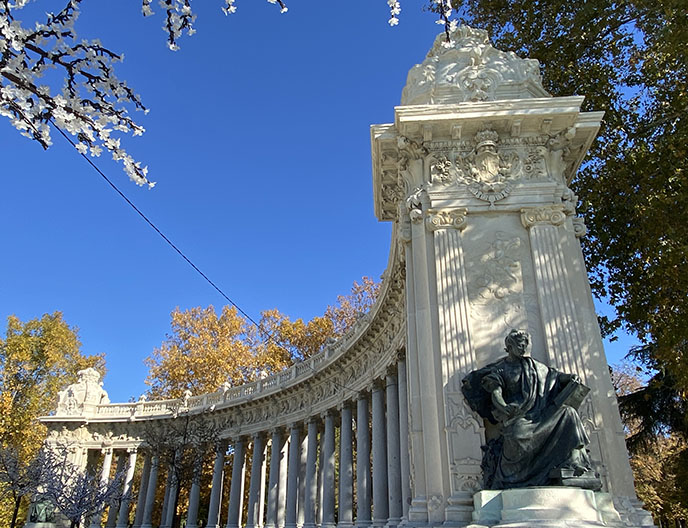
The former royal retreat spans 350 acres, and includes rose gardens and sculptures throughout. This is the King Alfonso XII monument…

… which is protected by proud lion statues that overlook the water.
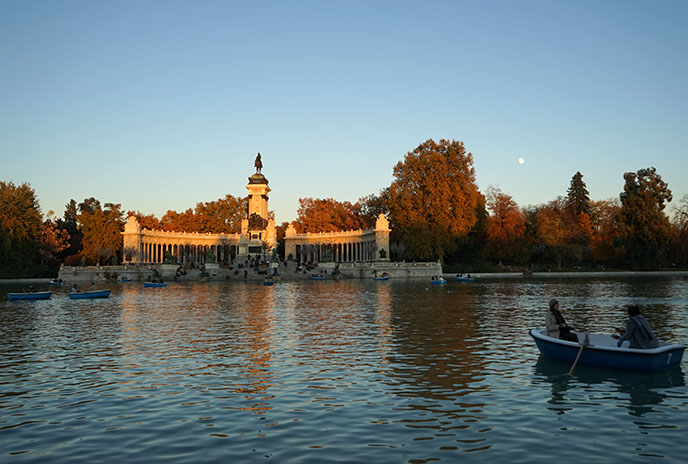
I watched couples rowing boats on Parque del Buen Retiro’s artificial lake. In the 17th century, the Spanish royals held water shows and mock battles here.
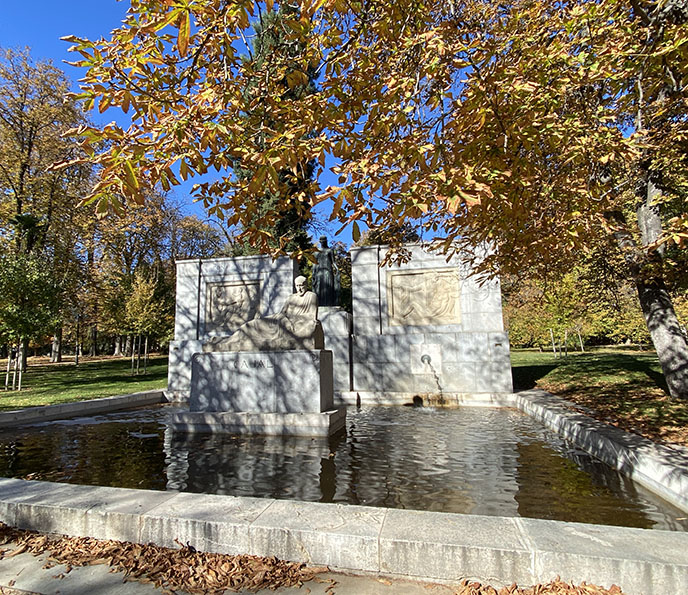
I loved strolling around and admiring the elegant fountains. This “Monument to Santiago Ramón y Cajal” was another favorite. The Art Deco reliefs show the goddess Minerva, and reference both human life and death.
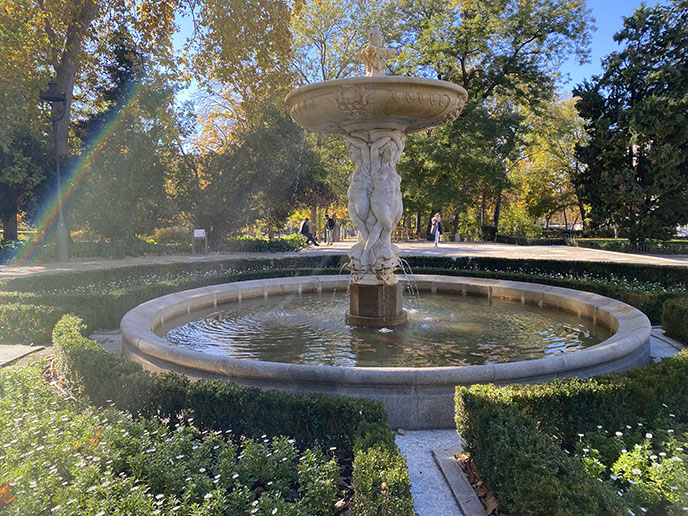
The brilliant light and water reflections made me feel like I was in a lucid dream. So glad I got to experience Madrid’s Retiro Park in November, for a last taste of fall.

It’s no secret that I am a fan of offbeat and bizarre museums / attractions — as well as robots. Put the two together, and you’ve got the funky Robot Museum Jugetronica!
Located inside Madrid’s Centro Comercial ABC Serrano shopping complex, the Robot Museum has an enormous collection of automatons from throughout the years. The resident “robotos” include Softbank’s Pepper (a humanoid and programmable bot), and Honda’s Asimo (which can perform the difficult task of climbing stairs).

I was fascinated by the wide variety of robots from different countries, including advanced automatons by Spain’s Juguetrónica. Of course, Japan is responsible for some of the cutest ones, like Sony’s Aibo the robot dog.

Aibo was big in Japan in the 2000s, and spawned many canine “breeds” and a fan magazine. The Robot Museum lets you play with a number of models, which is something I’d never had the chance to do before. I had fun petting an Aibo (who responded by wagging his tail), and having him chase a ball.

The museum gives a run-down of robots in pop culture that have captured our imaginations. These include Lost in Space, C3P0 of Star Wars, Terminator, and Japanese gundam (I saw a giant one in Tokyo).

I was particularly amused by the kawaii robots, which look like penguins, dinosaurs and other cute animals. Here’s Paro the therapeutic white seal, who comforted the elderly in Japanese care homes. (I want one!)

The robots can dance to the beat of music, respond to your commands, walk towards their master… I wonder, do these androids dream of electric sheep?

From the earliest incarnations (Medieval mechanical automatons) to today’s AI, robots have long fascinated and frightened humanity. Here are some retro bot toys from the 1970s.

The 1980s robots were my favorites. They’re clunky with buttons, and programmed through cassettes!

When it was released in the mid-80s, Tomy’s Omnibot 2000 was ahead of its time (on the left). Today, companies like Juguetrónica keep on blazing forward with artificial intelligence designs. Domo arigato, Mr Roboto, for the tour of the Robot Museum.
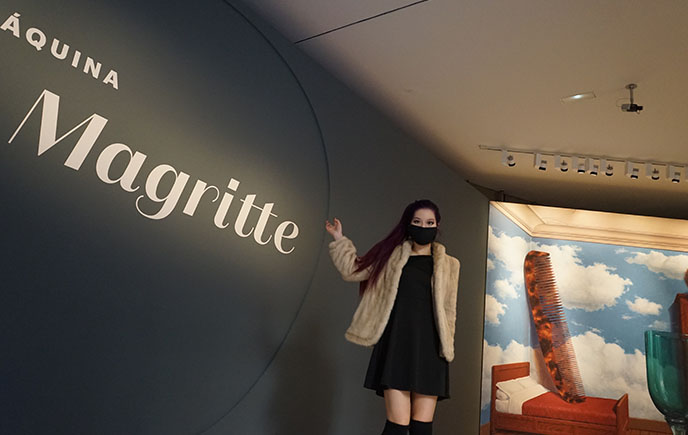
Madrid is one of Europe’s centers of art and culture. I ducked in to the Thyssen-Bornemisza Museum, which is part of the city’s “Golden Triangle of Art” (along with the Prado and the Reina Sofia national galleries).
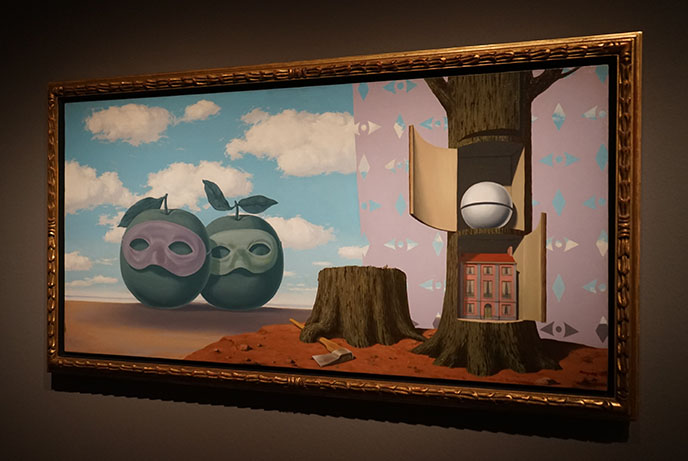
The Thyssen has an outstanding collection of European art throughout the ages. When I visited, they had a special Rene Magritte surrealist retrospective. (I dig his strange visions, and have also been to the Magritte Museum in Brussels, Belgium.)
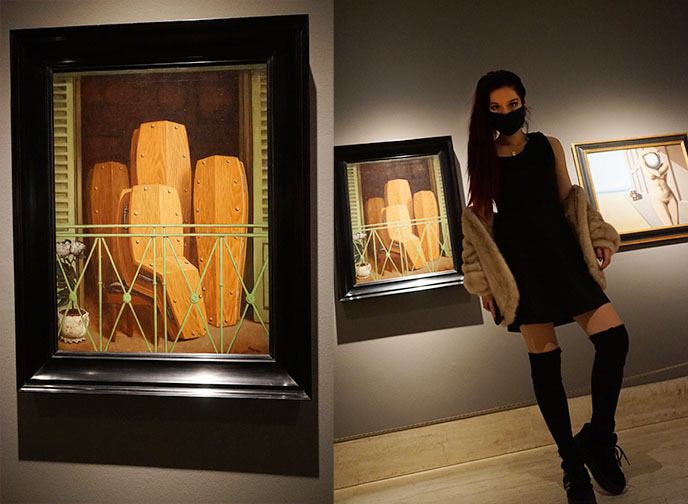
Magritte’s works are head-scratchers. I’m drawn to his more morbid paintings, such as this “family” of wooden coffins. (It’s called “Perspective II, Manet’s Balcony.”)
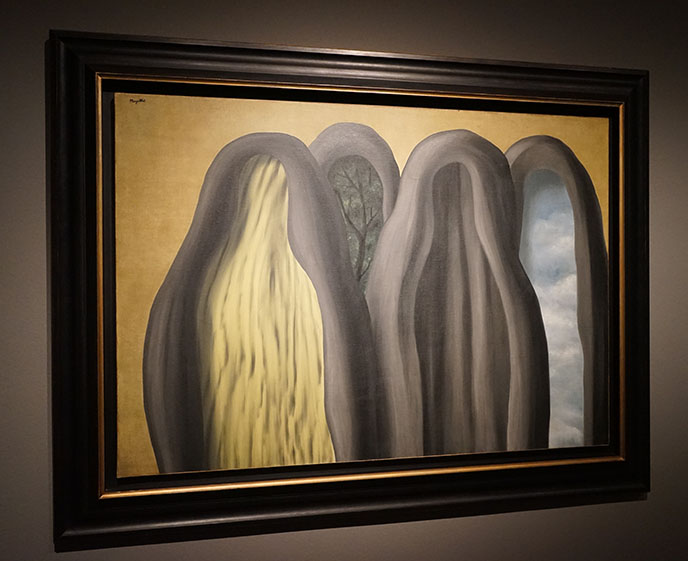
Magritte’s surrealism is masterful. These spooky shrouds look like portals into other universes.
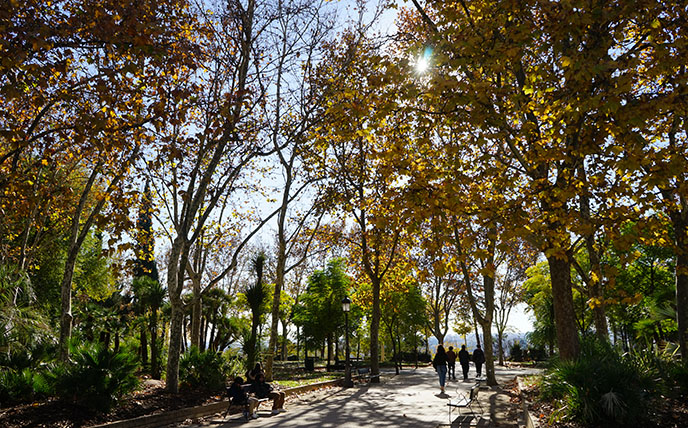
Being able to travel abroad and wander around a new city felt like a dream to me, in these complicated and ever-changing times.

Madrid has many free outdoor attractions, such as the Temple of Debod. This ancient Egyptian ruins came from Aswan, and were preserved here in 1968. (I have fond memories of visiting Abu Simbel in Aswan, Egypt…)
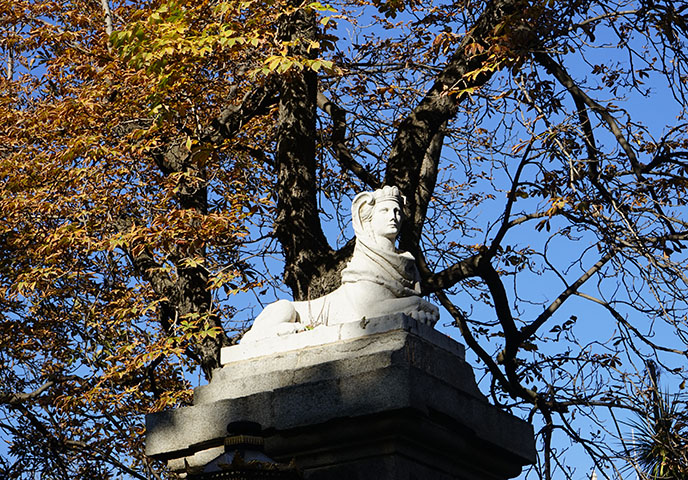
No matter where you wander in Madrid, you’ll see beautiful sculptures and architecture — like this Sphinx on top of a gate.
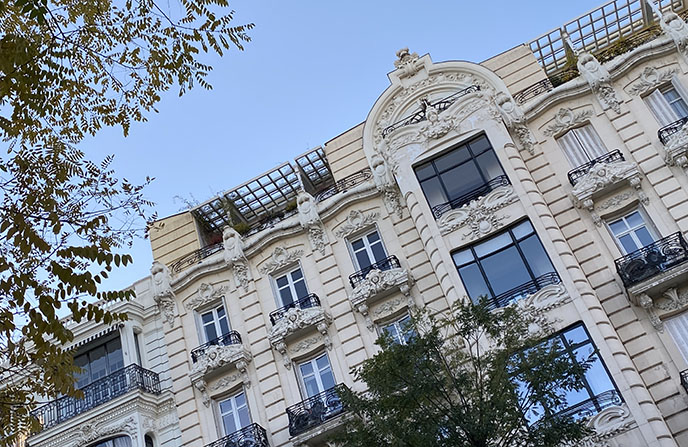
I couldn’t get enough of the ornate, carved facades. Imagine living in one of these apartments…

Along the wide shopping boulevard of Gran Via (known as “Spanish Broadway”), I spotted a double-fish fountain. I also encountered many “Maid of Honor” statues throughout Madrid, each uniquely and colorfully decorated. They’re a modern tribute to the ladies of Diego Velázquez’s famous “Las Meninas” painting.
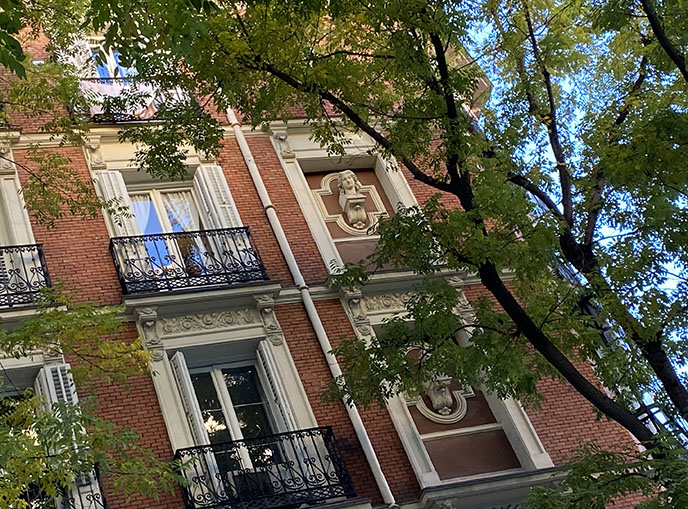
Classic art is everywhere in the capital of Spain. I encourage you to walk around, and see what you discover.
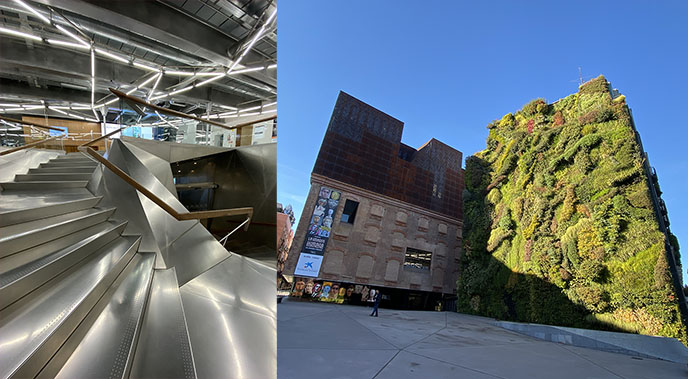
For avantgarde architecture, check out the CaixaForum Madrid museum and cultural center. The exterior features a stunning Vertical Garden living wall.
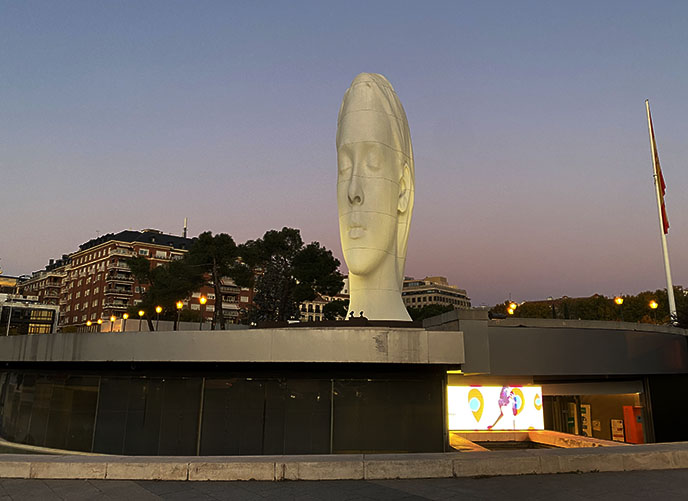
Madrid has a weird side as well. Meet “Julia” by Jaume Plensa, a giant sculpture of a woman’s head by the Fernán Gómez cultural center.

Back to my designer suite at The Pavilions Madrid (wearing a bat wing one-shoulder Goth dress by Fantasmagoria). This luxurious hotel turned out to be the perfect home base for my long walks around Madrid.
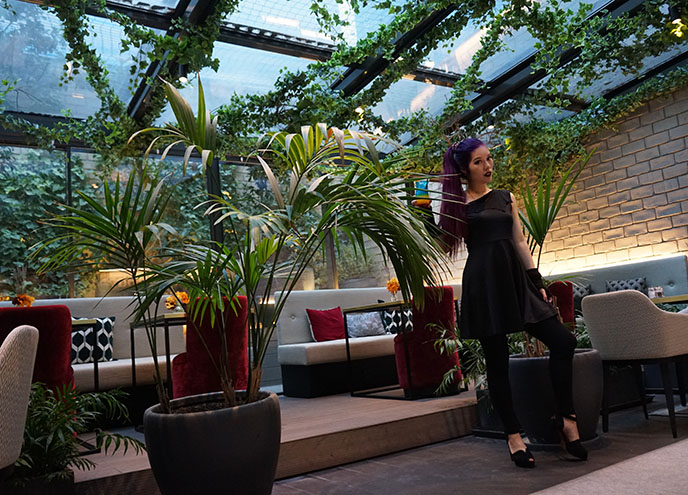
After two years in North America, being in Europe felt like a breath of fresh air. Gracias to everyone in Spain who welcomed me and made these experiences possible — including MedMeSafe Madrid for the rapid PCR test.
I’ll soon be sharing much more from Seville, Cordoba and Valencia, including Michelin-starred dining. Please check out my @lacarmina Instagram for updates. You can also review my previous blog posts about Barcelona and Granada, Spain here.
And finally, I was interviewed by Conde Nast Traveler about women and travel spending habits. I talk about how I want to return to Japan and Hong Kong, as soon as it’s possible… See my interview in CN Traveller Magazine.
SHARE & COMMENT
Modern art & architecture in Spain: new travel show video! Gothic Quarter shopping in Barcelona.

There’s no better place in the world to wear a skull cut-out dress… than the Gothic Quarter of Barcelona.
My filmmakers and I got to explore this fascinating neighborhood, thanks to Visit Spain and Eurail. As we walked through the narrow streets, we came across Star Wars stormtroopers, twee murals, and retro indie fashion.

But first, as my speech balloon indicates… Our Spain travel video is out today, on Business Insider Travel!
From Las Ramblas in Barcelona to the Alhambra of Granada, watch as I dive into the country’s art and culture.
Produced, filmed and edited by Borderless Media. I’m always amazed at how they capture our adventures and make them come to life.
Please take a moment to watch our Spain tourism video above, on Business Insider, and on @LaCarmina YouTube.

Perhaps you’re eyeing my outfit of the day. I adore this dress from Pretty Attitude Clothing, featuring a white cobweb print, lace skull cut-away back, and dangling bell sleeves.
My necklace is from an LA company, Vidakush Jewelry. The pendant is the word “universe” in Sanskrit.
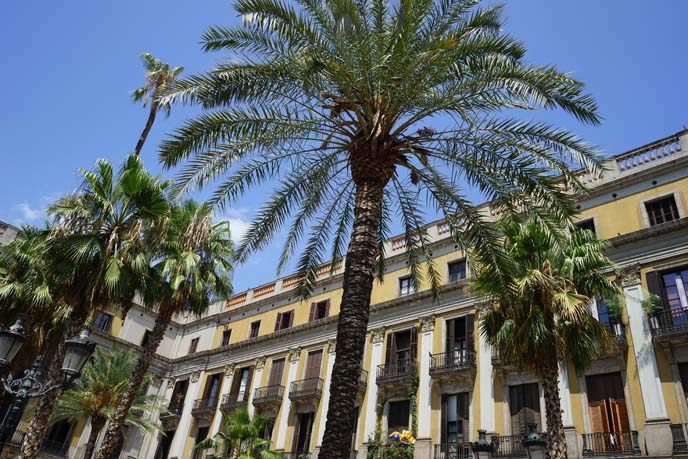
Most tourists start at Las Ramblas, the main shopping street of Barcelona that holds the famous market (Mercat de La Boqueria, or St Joseph’s Market). It’s worth checking out Ramblas, but I found it too tourist-driven and commercial for my taste.
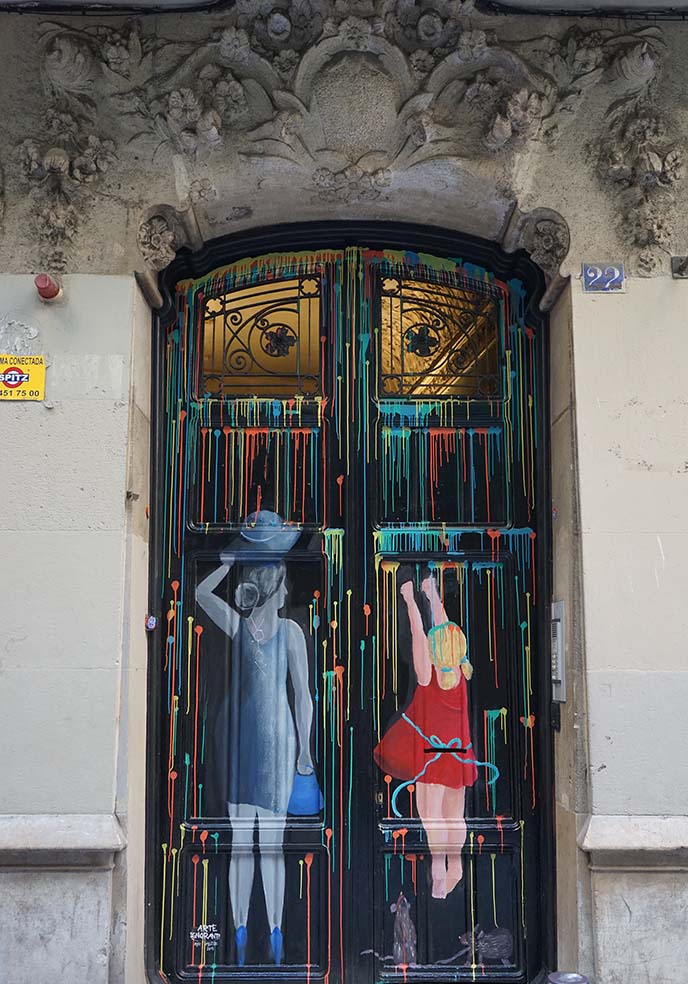
Instead, I encourage you to explore two of my favorite Barcelona neighborhoods: El Raval (see my travel guide here), and the spooky-named Gothic Quarter.

To get to the Gothic Quarter, you can start at Plaça Reial square near Las Ramblas, and keep on walking east.
This grand, “royal” plaza was designed in the 19th century, and features lanterns by Gaudi. Many people meet up at Placa Reial, and the atmosphere is especially abuzz at night.

We wandered into the El Barri Gòtic, the center of old Barcelona. Many of the walls and buildings date back to Medieval times, or even further back when the Romans occupied the city.

The Gothic Quarter is famous for its narrow, labyrinthine, cobblestone pathways. It’s great fun to stroll around, and take in the stone walls and art nouveau buildings on the way.
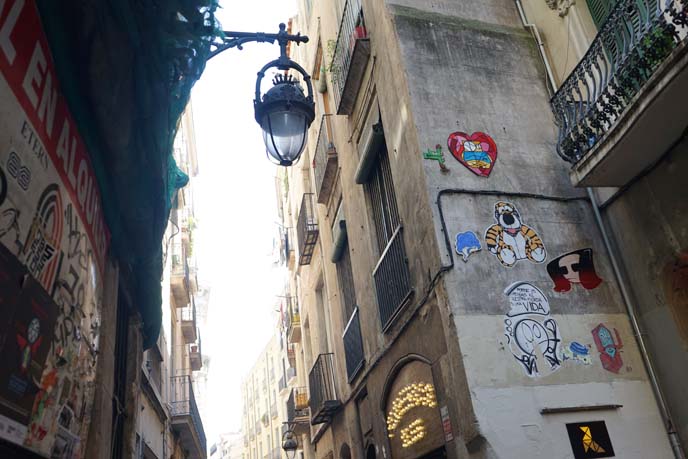
Similar to El Raval, there’s an artistic, indie feeling to this district. We spotted cheeky street art on the century-old walls.

These old-fashioned Roman door knockers got the graffiti treatment, next to a striking mural that makes use of the doorway as a canvas.

The Gothic Quarter is my favorite area for shopping. It’s filled with quirky, independent local boutiques — especially on the street Calle Avinyo.

Instead of commercial brands, you’ll find innovative design shops. Like this one, which lets you customize your own lamp from a rainbow of colorful balls.

The artists turned unexpected materials, such as basketballs, into hip lighting fixtures.

We popped into artisan shops that sold handmade purses, crafts, and other design objects. I think Spanish Cubist artist Picasso would be pleased with the creative scene here.

The Force is alive and well… in the Gothic Quarter! This clothing shop paid homage to Star Wars.

Have you ever seen Stormtroopers looking so fabulous?

I spent the afternoon browsing Spanish retro and vintage fashion boutiques. Their items are one of a kind, and not expensive.

My Pretty Attitude lace dress would fit right in with the cool fashion found here.
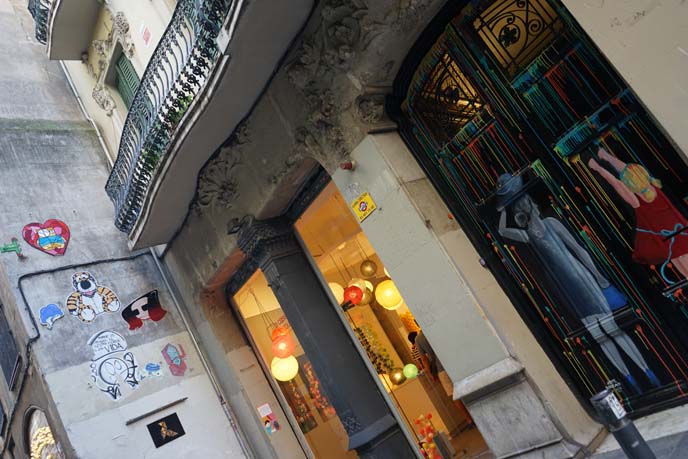
With an edgy creative culture and skull street art, the Gothic Quarter lives up to its name.
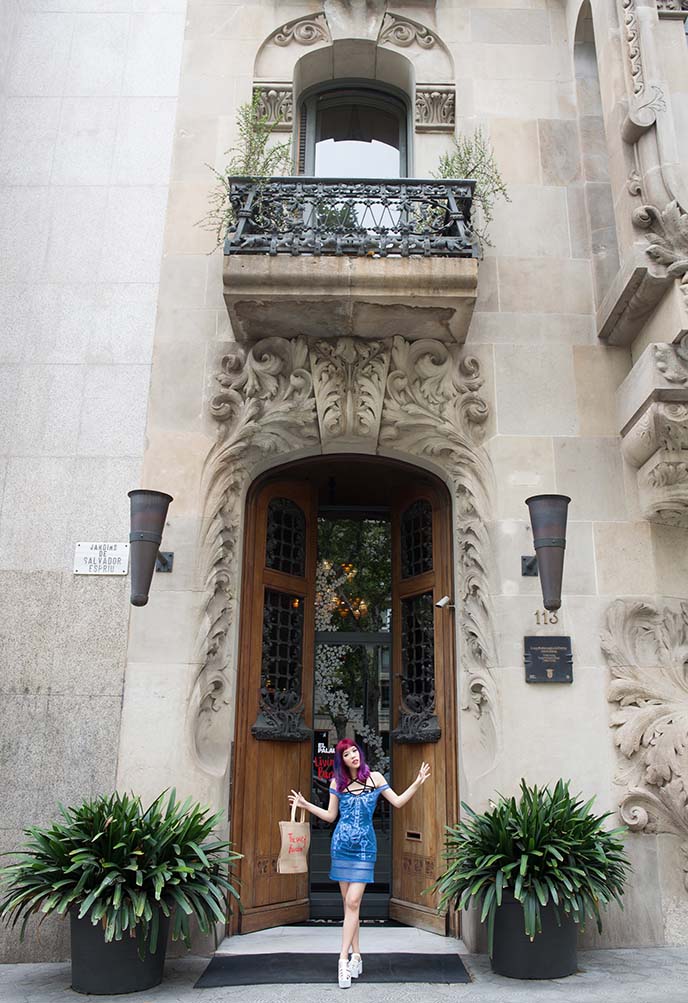
And now, we have to say “adiós”… because this is my last post about Spain, at least until I visit again! If you missed my previous stories about Barcelona and Granada, see them all here.
Gracias for watching our Spain travel video here!
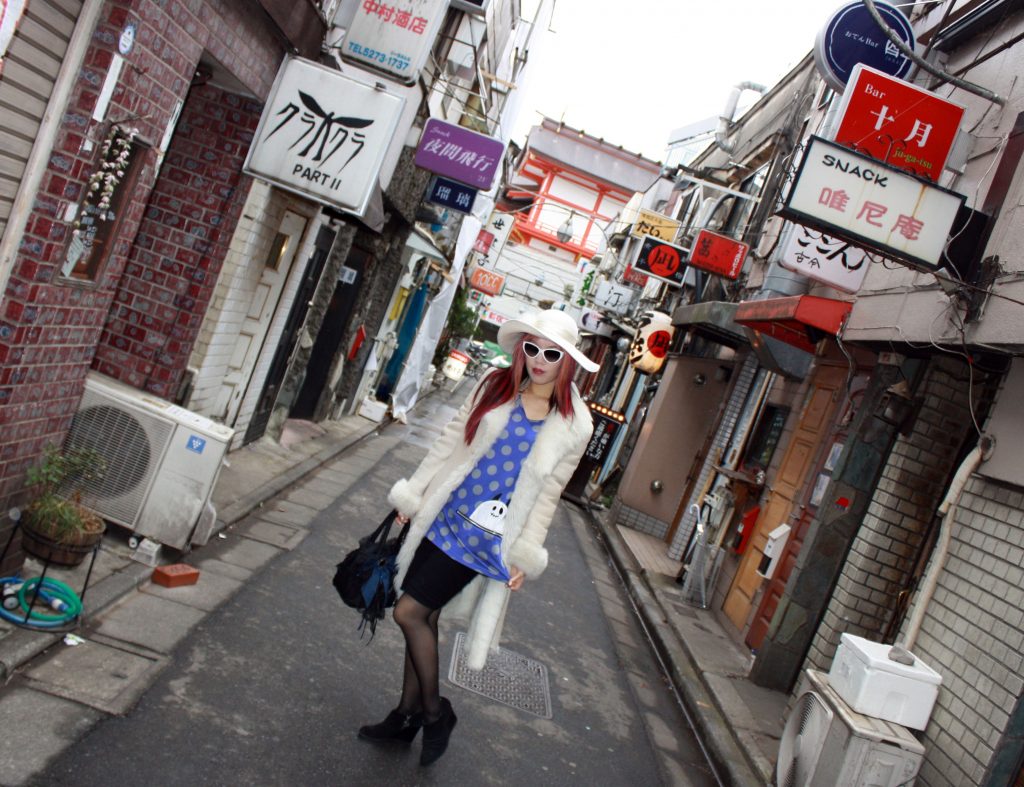
 LA CARMINA
LA CARMINA






